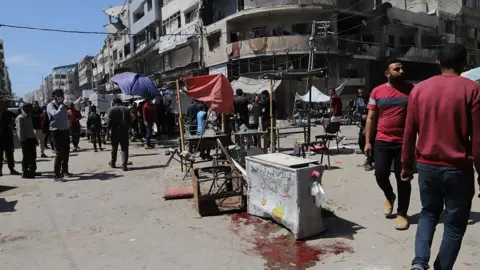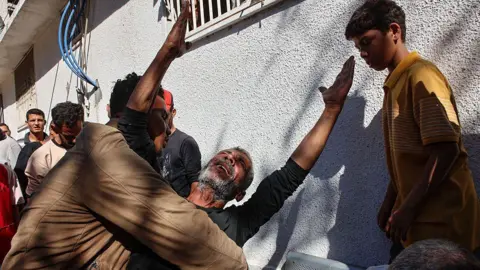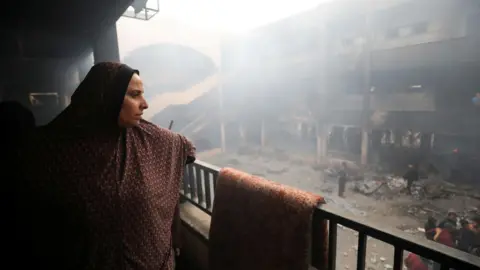Israeli strikes on Gaza restaurant and market kill 33, health ministry says
 Anadolu via Getty Images
Anadolu via Getty ImagesAt least 33 Palestinians have been killed and dozens wounded in two Israeli strikes on a crowded restaurant and market on the same street in Gaza City, medics and the Hamas-run health ministry say.
Graphic videos posted on social media showed bodies slumped at tables the Thailandy restaurant, in the northern Rimal neighbourhood, which was also operating as a community kitchen.
Footage from the nearby marketplace showed a small child with a rucksack lying dead in the street.
The Israeli military said it was looking into the reports.
Earlier, hospitals said at least 59 people had been killed in attacks since Tuesday night, most of them at two schools serving as shelters for displaced families.
The strikes come as Israel says it is preparing to intensify and expand its military campaign against Hamas after 19 months of war.
The two strikes on al-Wahda street in Rimal - one of Gaza's busiest commercial hubs - happened almost simultaneously on Wednesday afternoon, about 100m (330ft) apart.
Footage from the scene shortly afterwards showed wounded people being transported on chairs and in the backs of cars.
A woman carrying a baby in her arms and accompanied by two other children told Reuters news agency that they were inside the Thailandy restaurant when it was struck.
"Everyone died," she said. "The blood was like a lake, oh my baby, pools of blood."
Photos shared by local activists, which could not immediately be verified, showed a number of bodies. They appeared to include a boy selling coffee, two parents and their young son, and a market vendor sitting by his small stall.
Palestinian journalist Yahya Sobeih was also killed, colleagues said, only hours after his wife gave birth to their first child.
In another video, the owner of the nearby Palmyra restaurant, Abu Saleh Abdu, said many children, elderly people and passersby were killed.
Addressing the Israeli military, he asked: "What do [you] want to achieve? You haven't bombed any fighters or any weapons. You've only hit civilians."
The Thailandy restaurant was destroyed during last year's Israeli ground operation at the nearby al-Shifa hospital, but it had been rebuilt recently using tents and makeshift structures.
In addition to selling basic meals, the restaurant was also preparing hundreds of hot meals daily for humanitarian organisations to distribute to poor and displaced people.
Gaza's Hamas-run Government Media Office accused the Israeli military of committing war crimes by "deliberately targeting gatherings of civilians and displaced people" in four separate incidents over 24 hours.
 AFP
AFPWomen and children were among 33 people who were killed when the UN-run Abu Humeisa school in Bureij refugee camp, in central Gaza, was bombed twice on Tuesday, according to the Hamas-run Civil Defence agency.
Witness Ali al-Shaqra said on Wednesday that 300 families had been staying at the school and that the effect of the strike was like an "earthquake".
The Israeli military said it struck "terrorists who were operating within a Hamas command-and-control centre".
The military has not yet commented on a strike on the al-Karama school in the eastern Tuffah neighbourhood of Gaza City on Wednesday morning, which the Civil Defence said killed another 15 people.
It comes amid international condemnation of Israel's plans to expand and intensify its ground offensive against Hamas.
Israeli officials have said they include seizing all of the territory indefinitely, forcibly displacing Palestinians to the south, and taking over aid distribution with private companies despite protests from the UN and its humanitarian partners.
Prime Minister Benjamin Netanyahu said on Monday that his security cabinet had decided on a "forceful operation" to destroy Hamas and rescue its remaining hostages. He said Gaza's 2.1 million population "will be moved, to protect it", and that troops "will not enter and come out".
Israel cut off all supplies to Gaza on 2 March and resumed its offensive two weeks later after the collapse of a two-month ceasefire, saying it was putting pressure on Hamas to release its 59 remaining hostages.
The renewed Israeli strikes and ground operations have already resulted in hundreds of casualties and the displacement of an estimated 423,000 people, with about 70% of Gaza placed under Israeli evacuation orders, within an Israel-designated "no-go" zone, or both, according to the UN.
Aid agencies have also warned that mass starvation is imminent unless the blockade ends.
The UN has said Israel is obliged under international law to ensure food and medical supplies for Gaza's population. Israel has said it is complying with international law and that there is no aid shortage because thousands of lorry loads entered Gaza during the ceasefire.
 Reuters
ReutersPalestinian Authority Prime Minister Mohammad Mustafa, who is based in the occupied West Bank, told the BBC that the situation in Gaza was "a real catastrophe".
"This cannot continue. It's a siege, famine. No water, no electricity, no hope," he said.
Mustafa urged the international community to step up efforts to broker a new ceasefire and hostage release deal between Israel and Hamas as quickly as possible, warning: "People are dying every day in Gaza, and this should not happen anymore."
An Israeli official said on Monday that the expanded offensive would not begin until after US President Donald Trump's visit to the region next week, providing what he called "a window of opportunity" to Hamas to agree a deal.
However, a senior Hamas official Bassem Naim said on Tuesday that there was "no point" to negotiations while Israel continued what he called a "starvation war".
The Israeli military launched a campaign to destroy Hamas in response to an unprecedented cross-border attack on 7 October 2023, in which about 1,200 people were killed and 251 others were taken hostage.
At least 52,653 people have been killed in Gaza since then, including 2,545 since the Israeli offensive resumed, according to the territory's health ministry.
